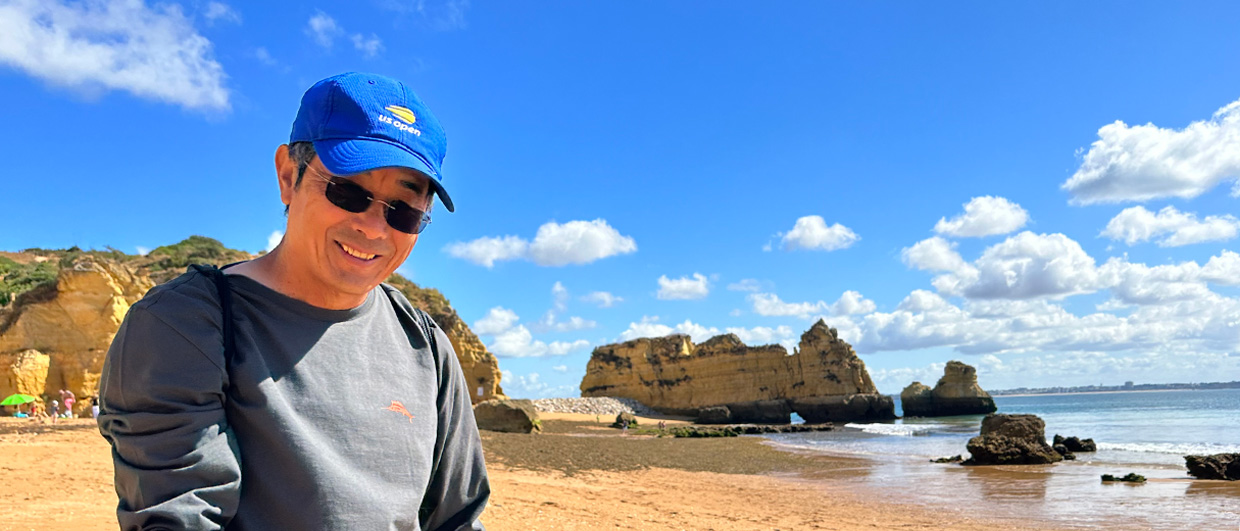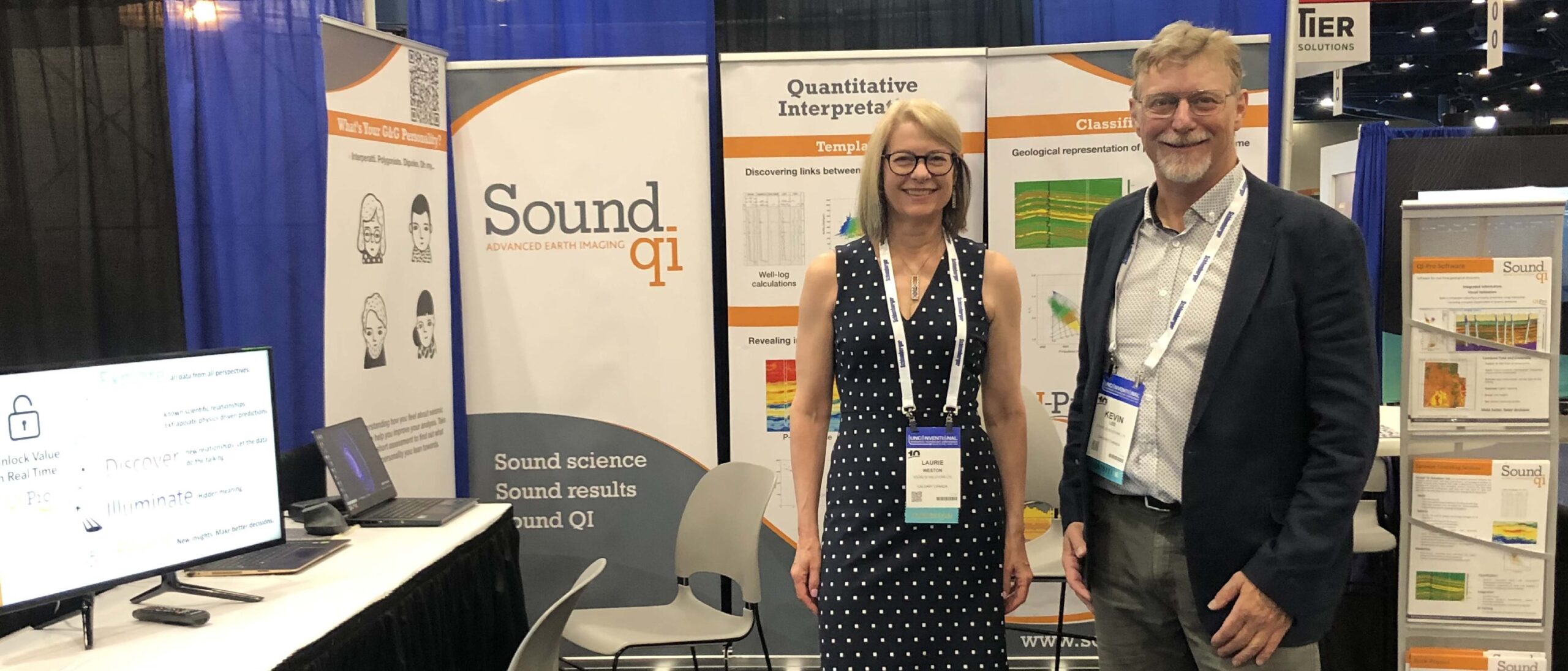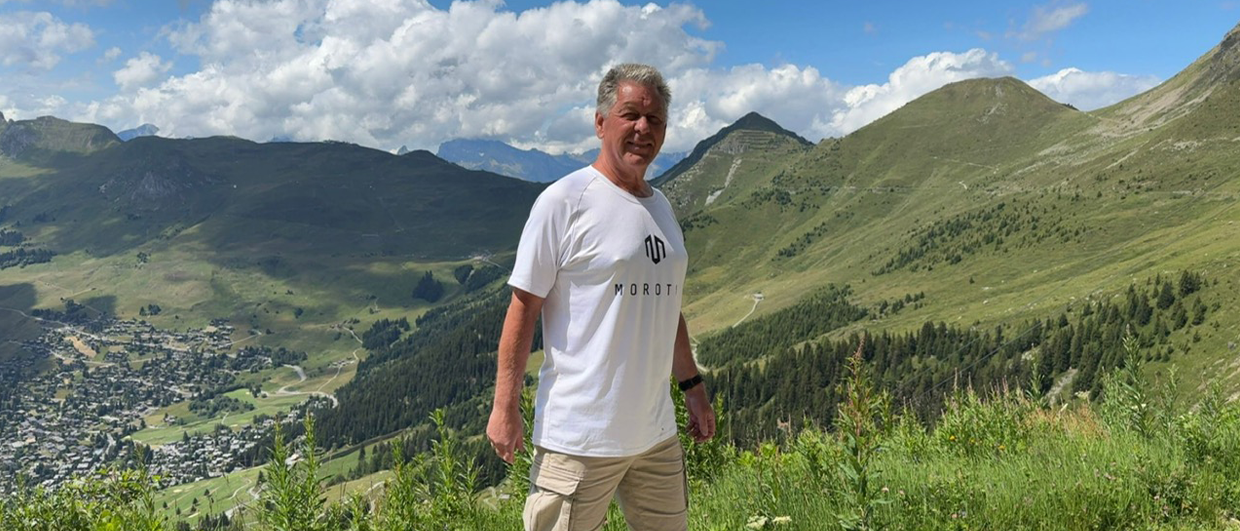Christian Höcker has had an interesting career in the oil industry – with an unusual kick-off. “I took my Masters degree in sedimentology and diagenesis at the University of Cologne in Germany,” he explains. “My research area was in the Southern Alps in Italy, and I was in the process of starting work on my PhD in the same fascinating area, when I heard that Shell was hiring staff after a long slack period in the oil industry. The newspapers had daily reports that the Dutch postal workers were on strike. I figured that application letters would not arrive at Shell, neither mine nor those of others; so I decided I’d try my luck, jumped in my car and just turned up at the Shell headquarters in The Hague. And you know, it worked; I started with the company two months later.”
“In those days, Shell was a very different place, more like a family, with your career being marked out by your ‘godfather’, the global chief of your discipline group – for good or bad, but certainly very personal,” he adds. “I joined the Shell Research Laboratory, initially as a reservoir geologist. As I showed a numerical aptitude, however, my godfather suggested I moved into production geophysics, where, among other topics, I worked on seismic image analysis, improving noise filtering techniques while keeping in the essential geology. And I got pretty much addicted to 3D seismic data as a kind of peephole to subsurface geology.”
Multicultural Malaysia
Christian worked for five years in the Research Lab, before moving to Shell International in 1990. “KSEPL, (Royal Dutch/Shell Exploration & Production Lab), in Rijswijk, near the Hague, was a great place to work, but in the computational field there was less scope for travel. Before I had joined the geophysical department, I had been doing outcrop work in Venezuela, looking at reservoir analogues, and I knew that I wanted to see more of the world,” he says.
He got his wish, spending the next five years in Sarawak on the island of Borneo, near the border with Brunei, where he worked initially as a seismic interpreter and production geologist. He then became Production Seismology Adviser in Shell Malaysia, supporting interpreters in integrated asset teams and managing all production seismology activities and quality control. It proved a very enjoyable posting.
“My wife and I love Sarawak,” Christian says. “It is so diverse and colourful, and such a multicultural and tolerant place that expatriates can fit in easily. My two children were both born in Sarawak and it was great fun being there. In fact, we spent our summer holiday this year revisiting the places we had been when the children were young.”
In 1995 the family returned, somewhat reluctantly, to Shell Head Office, where Christian worked as Principal Research Interpreter in Shell International E&P – Research & Technical Services. But there were major changes ahead for everyone in the company.
Self managing teams
In the mid-1990’s Shell underwent a major reorganisation, which had a huge effect on the employees. “All teams were empowered and made ‘self-managing’, the idea being that in this way they would become self-starting ‘think tanks’ with heightened enthusiasm and energy – but I’m afraid it only really worked for young, homogeneous teams. The average research team with a wide spectrum of age and experience got stuck with internal conflicts, with less experienced staff waiting for senior members to take the lead, while management instructed them to hold back.”
This system of self-management persisted until 2001, when the organisation returned to more traditional lines. Christian believes that it was part of a bold but misguided experiment which cost the company dearly. “It proved to be an impractical system, calling for the ideal employee but lacking mechanisms for dealing with real life weaknesses. It resulted in inertia on the one side, on the other wild ideas being pursued without common sense kicking in. But probably the worst result was that by stripping off experienced technical managers and experts Shell lost the ability to think in the long term, which is vital for successful operation in the oil industry.”
In addition, in the straightened oil industry economic climate of the late 1990’s, researchers had to spend substantial time simply securing funding for research projects, so in 1998 Christian left the Research unit and moved into Shell’s corporate service organisation based in Rijswijk. He became Discipline Chief for geophysical interpretation, doing a similar job as in Sarawak, but on a bigger scale, with a global study portfolio ranging from green-field exploration to mature field redevelopment.
A variety of roles
 The picturesque town of Delft is situated in the south-western part of the Netherlands, between Rotterdam and The Hague. It is well known for the many canals and beautiful buildings in the historic town centre; for the famous Delft blue pottery and the painter Vermeer; and more recently, for the Delft University of Technology, which has encouraged large numbers of technological companies like JOA to set up in the town. Photo: Jane Whaley“I have always been torn between keeping an overall view and being sufficiently technical to detect flaws and give appropriate advise. Personally I simply enjoy technical depth and do not mind spending a weekend on a challenging puzzle of a complex subsurface structure or depth conversion.” Christian admits. “By the time I left Shell in 2007 I was heading the seismic interpreter community in Shell, alternating that role with carrying out technical reviews of Shell projects at many locations. I have been teaming up for years with high-powered geologists, reservoir engineers and well specialists, reviewing hydrocarbon developments plans and even oil and gas reserves of entire countries. I am still much obliged to my colleagues at these reviews: they challenged whether all that seismic high-tech stuff was really relevant for the decisions at hand. We had heated discussions about true integration across disciplines and which approach would make you find the best way to develop hydrocarbons, or at least avoid the really bad ones. Without these reviews I might have been a good interpreter but would have had trouble sacrificing my work for the greater good.”
The picturesque town of Delft is situated in the south-western part of the Netherlands, between Rotterdam and The Hague. It is well known for the many canals and beautiful buildings in the historic town centre; for the famous Delft blue pottery and the painter Vermeer; and more recently, for the Delft University of Technology, which has encouraged large numbers of technological companies like JOA to set up in the town. Photo: Jane Whaley“I have always been torn between keeping an overall view and being sufficiently technical to detect flaws and give appropriate advise. Personally I simply enjoy technical depth and do not mind spending a weekend on a challenging puzzle of a complex subsurface structure or depth conversion.” Christian admits. “By the time I left Shell in 2007 I was heading the seismic interpreter community in Shell, alternating that role with carrying out technical reviews of Shell projects at many locations. I have been teaming up for years with high-powered geologists, reservoir engineers and well specialists, reviewing hydrocarbon developments plans and even oil and gas reserves of entire countries. I am still much obliged to my colleagues at these reviews: they challenged whether all that seismic high-tech stuff was really relevant for the decisions at hand. We had heated discussions about true integration across disciplines and which approach would make you find the best way to develop hydrocarbons, or at least avoid the really bad ones. Without these reviews I might have been a good interpreter but would have had trouble sacrificing my work for the greater good.”
Christian also developed and ran a number of training courses for Shell and European universities. “I enjoy talking to young people, developing their ideas and passing on knowledge. When preparing courses I regularly find that my position on technical matters is based on anecdotal evidence. The students may enjoy this for an hour but when running entire courses they will challenge you to argue using scientific evidence and logic. It means that I actually learn a lot from my own courses.”
However, there are some drawbacks to success in a major company. “As Chief Interpreter I was exposed to the inevitable politics, and I had to invest a lot of time into making things work; the reviews were fun but after so many years I found myself following a well developed script,” Christian explains. “In addition, while I had reached the top of the technical career ladder, people management has never been intuitive to me, so it was not obvious where in the company to go next. I had enjoyed my time in Shell, it’s a good company to work for, but I felt I had grown out of it.”
Small company environment
“Through my work I had contact with various software vendors and a chance to get deeper insight into their products and ways of working, JewelSuite among them. I knew that this package had a very solid foundation, but that there was still plenty of scope for development. So when the parent company, JOA, offered me the post of Director G&G Technology in 2007, it seemed the best option as an outlet for both my creativity and my experience.”
So far, Christian appears to relish working in the small, but expanding, company environment. “I have a lot more freedom, while having input into and a full understanding of the corporate interest. In Shell it was necessary to conform, even if I didn’t agree, and I found myself becoming less tolerant and patient. With JOA I have full access to the decision making process and trust my partners in management. My wife complains that I work rather longer hours than at Shell, but it is less stressful: I am energised by achieving something that is fully supported by my colleagues and will not be taken apart when I turn my back – which is rather common in the middle and higher ranks of larger publicly owned companies. It is true, though, that in comparison to a large company, one can feel professionally a little lonely, as there are not so many technical people to toss ideas around with – a good reason for starting your career with a larger company.”
NOCs are the future?
Having moved from a major well established oil company to a small, developing service organisation has given Christian a much broader insight into the whole hydrocarbon industry. He can see that, while there are scale advantages to be enjoyed by big companies, this by itself is no guarantee of competitive advantage in a changing world. “Shell, for instance, is big overall but has been operating so closely with other parties in many countries that it becomes difficult to recognise these local outfits as being Shell. When major asset holders were in need of technology and financing the local touch of Shell was clearly an advantage. However, top ranking technological knowledge is no longer confined to big IOC’s and, as oil prices soared, asset holders did not really need IOC’s for project financing,” he continues. “It was then that Shell started suffering from its openness and local ‘fusion’: it is difficult to maintain a competitive edge if your NOC partners have had access to your expertise and know you inside out. Companies that always had more centralised and closed corporate attitude, such as Exxon, are now better off.”
“I have now developed the service company viewpoint on oil companies; we appreciate them all! I like cooperating with smaller independent oil companies on very pragmatic approaches to reservoir management, just as much as interacting with national companies on high-tech methods. I am convinced that, over time, service companies will take over the role of IOC’s as technology provider to national asset owners, supporting them on their quest for understanding and control. Look at experiments carried out by big NOC’s like Saudi Aramco, trying to gain insight into hydrocarbon production processes. Only when you own and operate the asset you can afford such experiments. The technology and expertise of service companies is required to run the experiment, to analyse the outcome and help translate it into optimised development schemes for maturing fields. To me this is the winning combination in securing fossil energy supply, certainly outside North America and Europe; the big IOC’s will not remain the dominant force in this part of the industry,” concludes Christian Höcker.





